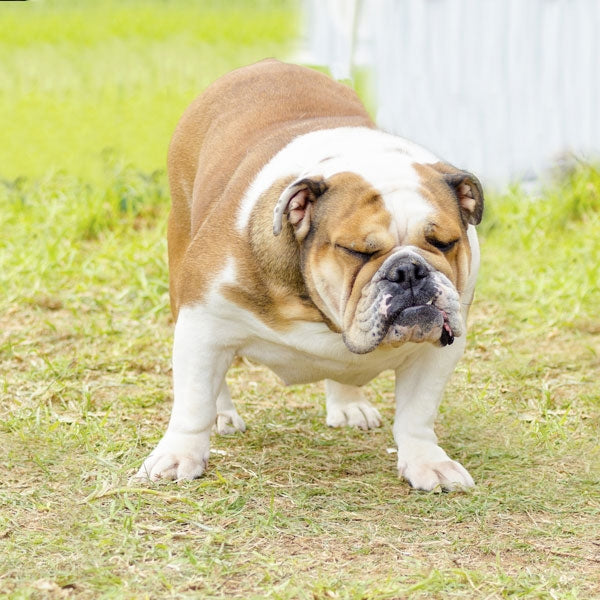Constipation is in dogs isn’t age or breed specific and can occur in any kind of dog at any stage of life. In simple words, it is the absence of normal stools; the dog faces difficulty in the discharge of feces from the body. The little amount of waste matter evacuated could be dark in color and hard, or at other times even after a lot of trying, and forcing there is no excrement released.
The constipated dog will assume the squatting position to enable the bowel movement, and may experience pain that it may indicate through low crying/moaning sounds during failed attempts at pooping.
If the pet isn’t able to defecate successfully for upto two to three consecutive days, pet parents mustn’t ignore the issue and involving the vet to treat the dog for constipation becomes important before the poop crisis turns into a bigger one often leading to appetite loss, nausea, laziness and weight loss.
What causes constipation in dogs?
- A pet dog’s diet that lacks the presence of dog foods rich in fiber.
- Not consuming enough drinking water.
- Insufficient exercise.
- Sometimes the colon gets blocked partly or fully when a dog consumes (perhaps accidentally) some small cloth or other such items that can’t be broken down and digested in the body. Sometimes a large bone ingested is too known to cause an impediment in the intestine.
- Swallowing of substances like grass, mud, or its loose hair while grooming.
- The large intestine can also be blocked due to the presence of tumors inside.
- Inflammation or some form of infection in the anal glands can be a source of discomfort while pooping.
- Intrinsic reasons include nerve or pelvic injury, as well as an injury of the colon muscles.
- A change in the pet’s routine or overall environment can bring about stress that may lead to problems such as constipation.
- Ailments relating to the kidney
- A consequence of surgery or a certain medicine or supplement.
- Inflamed prostate. Often a problem seen in elderly male dogs
- Hernias that can build up in the rectum.
General Measures to cure constipation in dogs
The treatment obviously depends upon the underlying cause that the veterinarian will diagnose after carrying out an examination of the pet.
Having talk about dehydration as one common cause, it is extremely essential for dog owner to track the amount of water their pets drink daily. During summer months the dog will require more water. Also after a lot of playing and running it is important to hydrate the exhausted body. If the canine’s diet mostly constitutes dry pellets then the water intake of the pet must be increased. However, the best & wholesome diet plan must be a combination of some food prepared at home using healthy recipes along with some kibbles. Food that is either raw or cooked at home contains moisture that will help in meeting to a certain degree your pet’s water requirements.
- Exercise- An active dog will have a healthy digestive system.
- Adequate supply of clean drinking water.
- Ensuring a fiber rich diet for the puppy/dog- Green leafy vegetables, pumpkin and coconut fiber. The vet can advise you on the daily requirements & exact quantity to be offered as per your dog’s body weight. P.S do not offer the pet any human foods rich in fiber such as grains.
- Organic apple cider vinegar as well as aloe juice can be added to the dog’s food. Check with the vet for the appropriate dosage.
- Acupuncture and massaging the Pressure Points is known to work wonders in cases of severe constipation.
- Neutering the pet. To avoid the problem of enlarged prostate that hinder the passage of stools, get the males neutered.
- The doctor will recommend surgery to do away with the Hernia that protrudes in the rectum.
- The vet can recommend Supplements such as Probiotics for pets; these are the good bacteria that help in maintaining a healthy immune system as well as fight the bad bacteria and prevent it from rising in the digestive tract of the dog.
There are laxatives for pets that help in relieving constipation. Make sure not to give your pet dog any related medicines that are meant for Humans.
An enema treatment (in this procedure a fluid is injected into the rectum via anus for evacuation of waste & cleansing of bowel) must not be given to the pet without consulting the veterinarian. It has been seen that certain enemas available in the market aren’t safe for animals.

